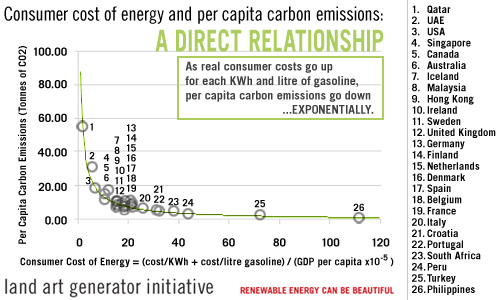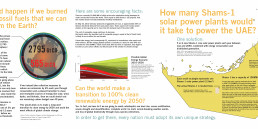Energy and resource conservation is good no matter how it is achieved. Most people use far more energy and water in their daily lives than they need to. Replacing incandescent bulbs with CFLs or LEDs, buying energy star appliances, and turning off lights when you’re not using them are all good things to do and to teach about.
But with so much emphasis on consumer awareness programs in the GCC for energy and water efficiency (all very well intentioned and good), it may be wise to remember that there is one very easy way that conservation can be accomplished: price structure.

There is a very strongly rooted history of low energy prices for the people of the Gulf states. And the fundamental reasoning behind the subsidies is very well-intentioned and quite populist: the petroleum is a natural resource gifted to the people and therefore all the people should benefit from it. A news article from 1977 points to this very clearly:
“‘Oil is a social service in the Gulf countries.’ said a foreign oil company executive. ‘Economics don’t come into it. Their philosophy is: How can we charge for it when it is coming out of the ground?'”
– Associated Press, July 20, 1977
But the same article also points out that there have always been times when talks of ending subsidies were quite serious (purely for economic reasons, not because of environmental concerns).
“Dubai has announced it is dropping its subsidy for electricity, which cost the state $25 million last year and would hve gone up to $35 million this year.” [$90 million/$125 million in 2010 dollars]
– Associated Press, July 20, 1977
It should be pointed out that there are two ways to ensure that people benefit from the natural resources of their lands. One way (the subsidies way) is to not charge very much for the refined product or the electricity it produces at the point of consumer purchase. Another way is to charge a “fair” price for the product and then use the money to invest back into a well-designed and sustainable infrastructure that will be there for the benefit of generations to come.
In other words, what is the benefit of a polluted environment that is depleted of all of its resources? When one is interested in all of the people benefiting from the resources of the land, why is that benefit restricted to the generations of people who are now living rather than to all generations?
If we are really serious about reducing use, there is really only one way to do it. Raise prices. The prices should be raised not only to account for the real costs of extraction, refinement, and distribution, but they must also reflect the “externalized costs” that fossil fuel combustion has on the environment and on human health. This goes for all the countries of the world because there is not one that has yet taken into consideration the real cost of the consumption of fossil fuels.
It is good news that the Emirates are seriously considering strong reductions in subsidies. Hopefully this is a step in the direction of complete eradication of them for the sake of the environment and the future. Some very good recent articles on the topic can be read here, here, here and here.
Graph XLS file
Sources for the graph:
http://mdgs.un.org/unsd/mdg/Data.aspx
http://en.wikipedia.org/wiki/Gasoline_and_diesel_usage_and_pricing
http://www.portfolio.com/interactive-features/2008/08/Gas-Prices-Around-the-World
http://tonto.eia.doe.gov/oog/info/gdu/gasdiesel.asp
http://www.dewa.gov.ae/community/conservation/ydc/slabtariff.aspx
http://en.wikipedia.org/wiki/Electricity_pricing
http://www.energy.eu/#domestic

